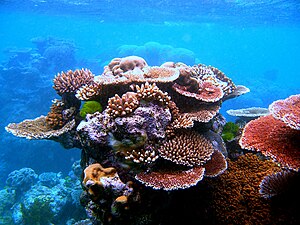
Coral reef protection is the process of modifying human activities to avoid damage to healthy coral reefs and to help damaged reefs recover. The key strategies used in reef protection include defining measurable goals and introducing active management and community involvement to reduce stressors that damage reef health. One management technique is to create Marine Protected Areas (MPAs) that directly limit human activities such as fishing.[1]
Recreational scuba diving can have a measurable adverse impact on tropical coral reefs, mostly due to contact damage of brittle and fragile branched stony corals. The most common damages of corals while diving occurs due to the fins striking the corals as well as hands, knees, and equipment gauges.[2] This can be reduced by improving diver buoyancy and trim skills, and by educating divers on the consequences of clumsy behavior on the reef ecosystem.[3][4] Divers given a 45 minute presentation on coral biology and protected areas combined with a brief in water demonstration have been shown to cause less damages to corals during their dive.[5]
It takes approximately 10 thousand years for coral polyps to form a reef, and between 100,000 and 30 million years for a fully mature reef to form.[6]
- ^ "Coral Reefs". National Fish and Wildlife Foundation. Archived from the original on 2019-12-22. Retrieved 2015-05-07.
- ^ Barker, Nola H. L.; Roberts, Callum M. (2004-12-01). "Scuba diver behaviour and the management of diving impacts on coral reefs". Biological Conservation. 120 (4): 481–489. Bibcode:2004BCons.120..481B. doi:10.1016/j.biocon.2004.03.021. ISSN 0006-3207.
- ^ Hammerton, Zan (2014). SCUBA-diver impacts and management strategies for subtropical marine protected areas (Thesis). Southern Cross University. Archived from the original on 2020-05-26. Retrieved 2019-09-17.
- ^ Johansen, Kelsey (2013). "Education and training". In Musa, Ghazali; Dimmock, Kay (eds.). Scuba Diving Tourism: Contemporary Geographies of Leisure, Tourism and Mobility. Routledge. ISBN 9781136324949.
- ^ Medio, D.; Ormond, R. F. G.; Pearson, M. (1997-01-01). "Effect of briefings on rates of damage to corals by scuba divers". Biological Conservation. 79 (1): 91–95. Bibcode:1997BCons..79...91M. doi:10.1016/S0006-3207(96)00074-2. ISSN 0006-3207.
- ^ "Stanford : Types of Reefs". web.stanford.edu. Archived from the original on 17 November 2017. Retrieved 3 September 2019.
© MMXXIII Rich X Search. We shall prevail. All rights reserved. Rich X Search
